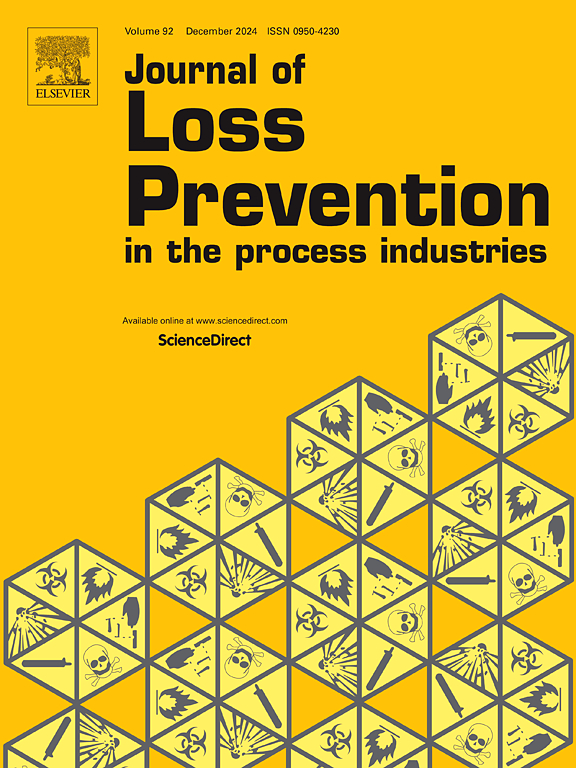对 20L 球内不同粉尘分布系统的研究
IF 3.6
3区 工程技术
Q2 ENGINEERING, CHEMICAL
Journal of Loss Prevention in The Process Industries
Pub Date : 2024-11-15
DOI:10.1016/j.jlp.2024.105492
引用次数: 0
摘要
要确定粉尘的若干安全特性,需要将其分散在空气中。通常使用两个容器,一个超压容器容纳粉尘,并通过喷嘴将粉尘分散到第二个容器中,在第二个容器中发生爆炸。这种方法的缺点是有些粉尘无法正常通过喷嘴。另一个缺点是,两个容器之间的压力平衡取决于粉尘的装载量,特别是对于重粉尘和高装载量,爆炸容器内的初始压力可能会降低。絮状粉尘或通过超压薄喷嘴输送可能有危险的粉尘(纳米粉体、锆)也很难根据现有标准进行测试,并且可能无法使用标准喷嘴进行测试,这些喷嘴目前用于确定安全特性。最近的一个测试硝化纤维素的例子提出了这样一个问题,即某些粉尘通过喷嘴的分布和挤压是否会对测试设备造成危险,在最坏的情况下,是否会对操作者造成危险。此外,研究人员也没有提供足够的几何形状,以便其他人可以复制。ISO 标准中提到了一种用于分散絮状或粗粒粉尘的替代喷嘴,但也没有对其进行描述:本文研究了四种类型的喷嘴:两种已被广泛使用的标准喷嘴、一种在 2016 年被引入国际标准但仍很少使用的替代类型喷嘴,以及一种为克服一些观察到的缺点而设计的喷嘴。比较了有粉尘负载和无粉尘负载时的喷射曲线以及爆炸特性。最后,针对不同类型的粉尘提出了建议。本文章由计算机程序翻译,如有差异,请以英文原文为准。
Investigations on different distribution systems for dusts inside the 20L-sphere
The determination of several safety characteristics for dusts requires the dispersion of it in air. This is normally conducted using two vessels, one with an overpressure holding the dust and dispersing it into the second one, where the explosion takes place, through a nozzle. This procedure has the disadvantage that some dusts cannot be conveyed through the nozzle properly. Another disadvantage is that the pressure balancing between the two vessels depends on the dust loading and especially for heavy dusts and high loadings the initial pressure inside the explosion vessel might be reduced.
Flocky dusts or dusts that might be dangerous to convey through a thin nozzle with an overpressure (nanopowders, zirconium) are also difficult to test according to the extisting standards andmay not be tested with the standard nozzles, that are so far used for the determination of safety characteristics. One very recent example, testing nitrocellulose, raised the question, whether some dusts even pose a risk being distributed and pressed through a nozzle for the testing device and, in worst case, for the operator.
Previous researchers have developed alternative types of nozzles for specific types of dust, but provide limited evaluation of their performance relative to standard nozzles. Additionally researchers have not provided sufficient geometry so that they can be reproduced by others. One alternative nozzle for the dispersion of flocky or coarse dusts is stated in the ISO standard but not described there either.
This article investigates four types of nozzles: The two standard ones that are widely used already, an alternative type, that got introduced into the international standard in 2016 but is still seldomly used and one that was constructed to overcome some of the observed disadvantages. The injection curves are compared with and without dust loadings as well as the explosion characteristics. Eventually, a suggestion is given for different types of dusts.
求助全文
通过发布文献求助,成功后即可免费获取论文全文。
去求助
来源期刊
CiteScore
7.20
自引率
14.30%
发文量
226
审稿时长
52 days
期刊介绍:
The broad scope of the journal is process safety. Process safety is defined as the prevention and mitigation of process-related injuries and damage arising from process incidents involving fire, explosion and toxic release. Such undesired events occur in the process industries during the use, storage, manufacture, handling, and transportation of highly hazardous chemicals.

 求助内容:
求助内容: 应助结果提醒方式:
应助结果提醒方式:


